Why Ferrets Need Access to Constant Fresh Water in Their Habitat
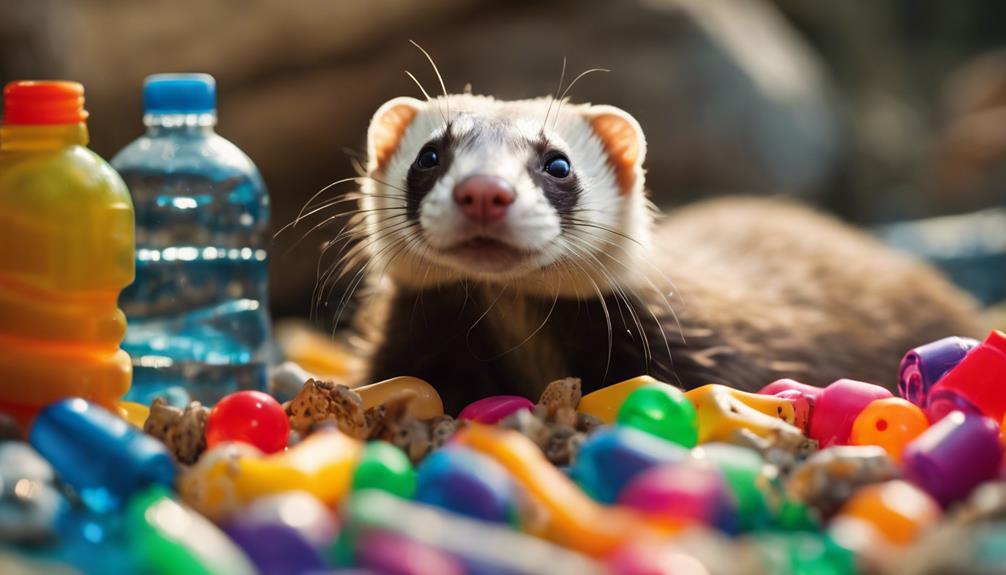
Water is a crucial element in the diet of ferrets, as it plays a vital role in maintaining their health and well-being. Ferrets need access to clean and fresh water at all times to prevent dehydration and ensure proper bodily functions. Dehydration can lead to serious health issues for ferrets, such as urinary tract problems and organ failure. Therefore, it is essential for ferret owners to provide their pets with an adequate supply of water to keep them healthy and happy.
Hydration is especially important for ferrets because they have a low thirst drive and may not always drink enough water on their own. Ferrets are prone to heat stress, which can quickly lead to dehydration if they do not have enough water available to help regulate their body temperature. Additionally, ferrets are obligate carnivores, which means they obtain most of their moisture from their food. However, commercial ferret diets may not provide enough moisture, making it even more critical for ferrets to have access to fresh water at all times.
In conclusion, water is essential for the health and well-being of ferrets. Ferret owners must ensure that their pets have access to clean and fresh water at all times to prevent dehydration and maintain proper bodily functions. By understanding the importance of hydration for ferrets, owners can help their pets lead happy and healthy lives.
Ferrets Have High Metabolism
Ferrets possess a high metabolism that necessitates careful attention to their water intake to maintain optimal health. Due to their rapid metabolism, ferrets have high energy levels and require a constant supply of fresh water to support their bodily functions effectively. Metabolism regulation is essential for these small carnivores as it directly impacts their energy levels and overall well-being. Ferrets convert food into energy quickly, leading to increased water loss through respiration and waste elimination. Without adequate water intake, ferrets can quickly become dehydrated, impacting their metabolism and energy levels.
To regulate their metabolism and sustain their energy levels, ferrets need access to clean water at all times. Water supports various physiological processes in ferrets, including digestion, nutrient absorption, and temperature regulation. By providing unlimited access to fresh water, ferret owners can ensure that their pets remain hydrated, healthy, and energetic. Monitoring their water intake is crucial to preventing dehydration and maintaining their metabolism at optimal levels.
Water Supports Digestive Health

Supporting optimal digestive health in ferrets involves acknowledging the crucial role water plays in facilitating proper nutrient absorption and maintaining gastrointestinal function. Adequate hydration is essential for the digestive system to break down food efficiently and extract essential nutrients. Water helps in the digestion process by aiding in the breakdown of food particles and the movement of nutrients through the gastrointestinal tract. Additionally, hydration supports the secretion of digestive enzymes and juices necessary for proper digestion.
Proper hydration also influences a ferret's behavior and energy levels. When a ferret is well-hydrated, it's more likely to exhibit normal behavior patterns, such as being active, playful, and alert. Dehydration can lead to lethargy, decreased appetite, and overall reduced energy levels. By ensuring access to constant fresh water, ferret owners can help maintain their pets' digestive health, overall well-being, and ensure they have the energy needed for their daily activities.
Dehydration Risks in Ferrets
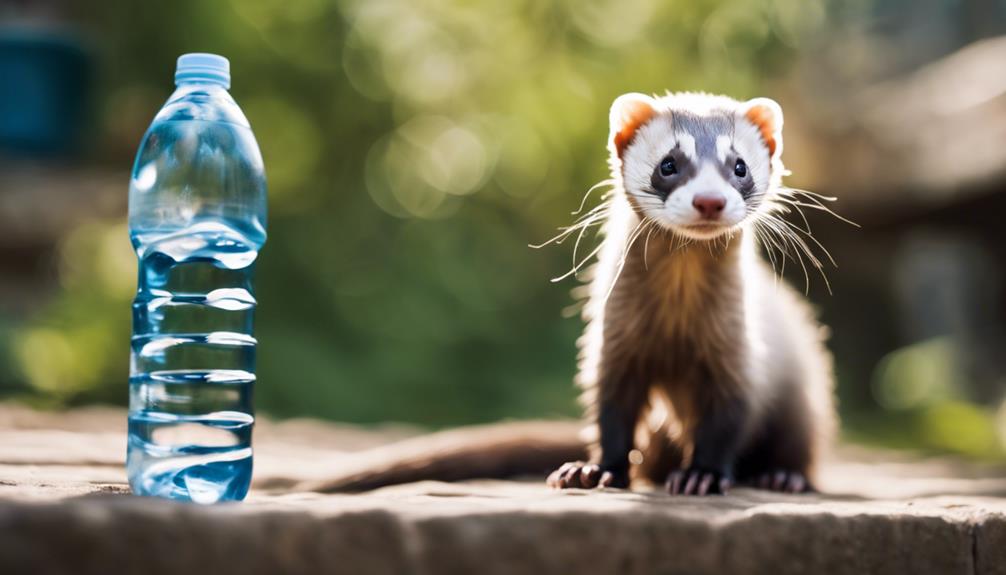
Ferrets are prone to dehydration, especially if they don't have adequate access to water. Signs of dehydration in ferrets include lethargy, dry gums, and sunken eyes.
Ensuring proper hydration is essential for maintaining a ferret's overall health and preventing serious complications.
Dehydration Signs in Ferrets
Recognizing the signs of dehydration in ferrets is crucial for their well-being and health. Dehydration can lead to serious health issues and must be addressed promptly.
Here are some signs to look out for:
- Lethargy: If a ferret is unusually tired or inactive, it could be a sign of dehydration.
- Dry Mouth and Gums: Check for sticky saliva, dry mouth, or tacky gums, which are indicators of dehydration.
- Skin Tenting: Gently pinch the skin on the back of the neck – if it stays tented rather than springing back, the ferret may be dehydrated.
Importance of Hydration
To maintain optimal health and prevent dehydration risks in ferrets, ensuring proper hydration is essential. Hydration benefits ferrets by supporting various bodily functions, such as digestion, circulation, and temperature regulation. Ferrets have high energy levels and metabolisms, necessitating adequate fluid intake to prevent dehydration.
Dehydration can lead to serious health issues, including organ failure and lethargy. Monitoring a ferret's water consumption is crucial, especially during hot weather or illness when fluid requirements may increase. Providing fresh water at all times encourages regular drinking habits and prevents dehydration.
Owners should be vigilant in ensuring their ferrets have access to clean, fresh water to promote overall health and well-being. Adequate hydration is fundamental to a ferret's vitality and longevity.
Water Access Essential
Ensuring consistent access to water is crucial for preventing dehydration risks in ferrets. Adequate hydration benefits their overall health and well-being, and monitoring their water consumption is essential.
Here are three key reasons why water access is essential for ferrets:
- Preventing Dehydration: Ferrets are prone to dehydration due to their high metabolic rate, so constant access to water helps maintain their hydration levels.
- Regulating Body Temperature: Water intake aids in regulating a ferret's body temperature, especially during hot weather or when they're active.
- Supporting Organ Function: Sufficient water consumption is vital for proper organ function, including kidney health and digestion in ferrets.
Importance of Hydration for Playfulness
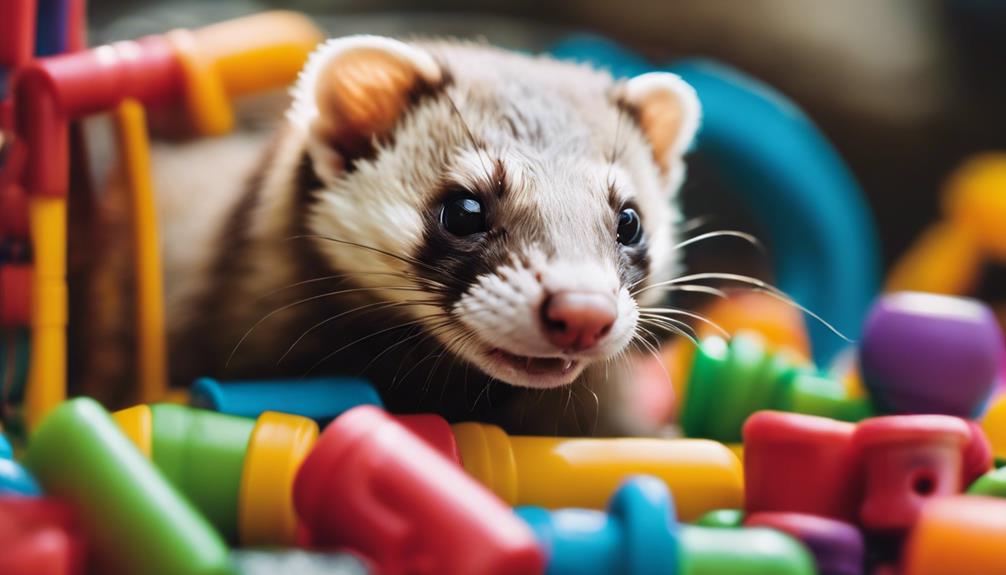
Staying adequately hydrated is crucial for maintaining the playfulness and energy levels of ferrets. Hydration benefits ferrets by ensuring that their bodies function optimally, which directly impacts their behavior and activity levels. Ferrets that have access to constant fresh water tend to be more active, engaged, and playful compared to those that are dehydrated. Water intake plays a significant role in a ferret's overall well-being, as even mild dehydration can lead to behavior changes such as lethargy, irritability, and decreased interest in play.
When ferrets are adequately hydrated, they're more likely to exhibit their natural curiosity and high energy levels, engaging in activities that promote physical exercise and mental stimulation. Dehydration can hinder a ferret's ability to enjoy playtime, impacting their quality of life. By providing ferrets with constant access to fresh water, owners can ensure that their pets remain vibrant, playful, and healthy. Remember, a well-hydrated ferret is a happy and active ferret.
Kidney Function and Water Intake
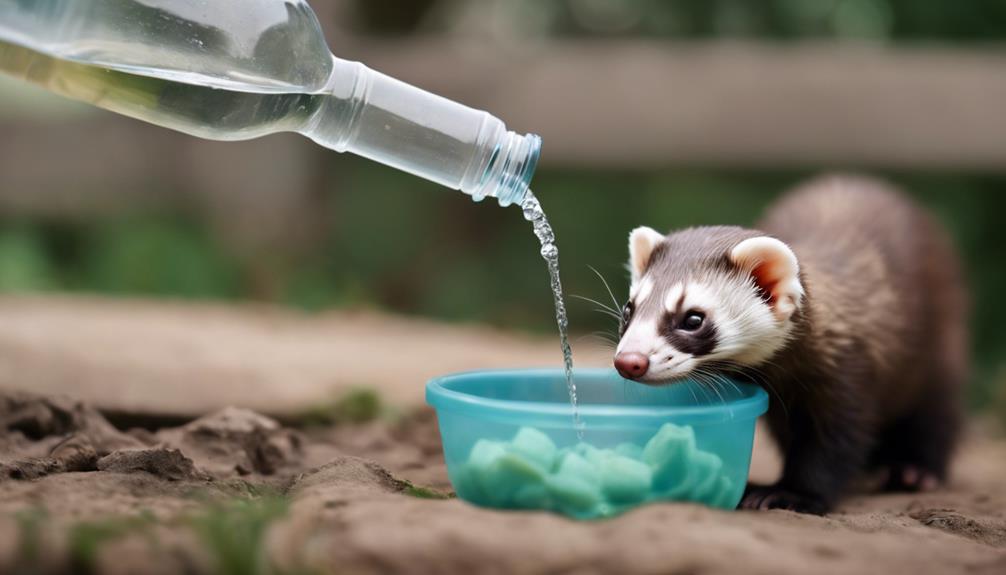
Ferrets rely on their kidneys to regulate their water balance, making proper hydration crucial for their overall health.
Understanding the relationship between kidney function and water intake is essential for ensuring that ferrets receive the proper amount of fluids to support their bodily functions.
Water and Kidneys
Proper kidney function in ferrets directly impacts their water intake requirements. Ferrets rely on their kidneys to regulate fluids and eliminate waste effectively, highlighting the importance of kidney health for overall well-being.
Here are three key points to consider regarding water and kidneys in ferrets:
- Hydration Benefits: Adequate water intake supports optimal kidney function by aiding in the filtration of waste and maintenance of electrolyte balance.
- Kidney Health: Ensuring proper hydration levels is essential for preventing kidney issues such as dehydration-related kidney disease.
- Water Intake Regulation: Ferrets with healthy kidneys can effectively adjust their water intake based on their hydration needs, emphasizing the crucial role of kidney function in maintaining proper hydration levels.
Hydration Importance
A fundamental aspect of ferret care involves understanding the intricate relationship between kidney function and water intake, emphasizing the critical role hydration plays in maintaining overall health.
Water balance is essential for proper kidney function in ferrets. Adequate hydration levels support the kidneys in filtering waste and toxins from the blood, ensuring optimal health.
Ferrets have a high metabolic rate, making them prone to dehydration if they don't have constant access to fresh water. Dehydration can lead to kidney issues, affecting their ability to regulate water balance effectively.
Water for Temperature Regulation

Regularly providing access to fresh water is crucial for ferrets to regulate their body temperature effectively. Ferrets, like many mammals, rely on water for thermoregulation. Here are three ways water helps ferrets regulate their body temperature:
- Metabolic Rate: Water plays a vital role in maintaining a ferret's metabolic rate. Adequate hydration supports the body's ability to efficiently convert food into energy, which is crucial for sustaining the metabolic processes involved in temperature regulation.
- Cooling Mechanism: Ferrets use water to cool themselves down through evaporation. They may moisten their paws or bodies with water and then groom themselves, allowing the water to evaporate and dissipate heat from their bodies.
- Preventing Heat Stress: Access to water helps ferrets prevent heat stress, especially in warmer environments. By drinking water, ferrets can maintain proper hydration levels, which are essential for preventing overheating and related health issues.
Ensuring ferrets have constant access to fresh water is essential for supporting their temperature regulation mechanisms and overall well-being.
Preventing Urinary Tract Issues
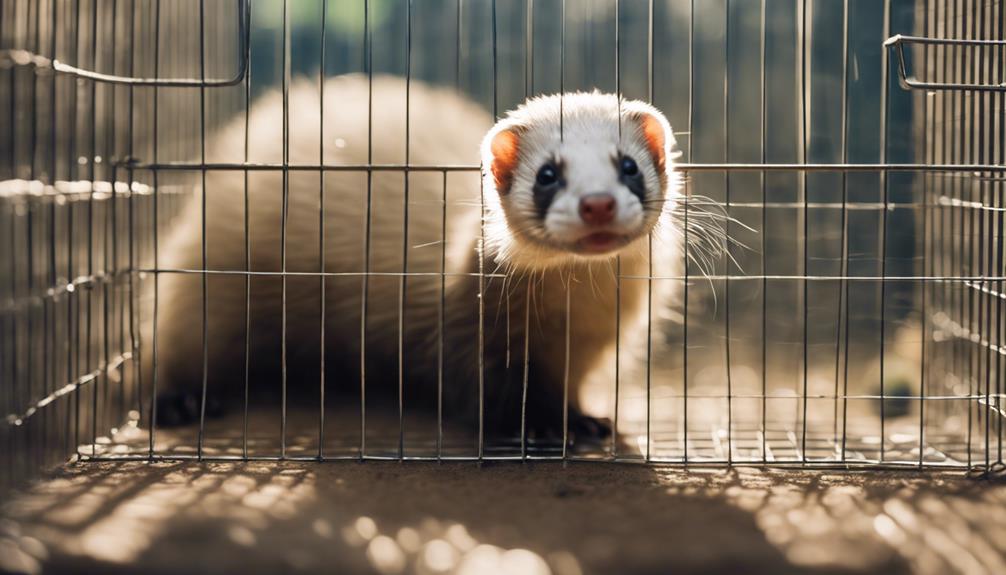
To maintain optimal urinary tract health in ferrets, ensuring adequate hydration levels is paramount. Ferrets are prone to urinary tract infections, which can lead to serious health issues if not addressed promptly. Providing constant access to fresh water is crucial in preventing these infections. Hydration helps flush out toxins and bacteria from the urinary system, reducing the risk of blockages and other complications. It's essential to monitor your ferret's water intake to ensure they're drinking enough throughout the day.
In addition to hydration, a balanced diet plays a vital role in maintaining urinary health in ferrets. Feeding them high-quality ferret food that meets their nutritional needs can help prevent urinary tract issues. Avoid giving them foods high in sugar or carbohydrates, as these can contribute to urinary problems.
Regular veterinary check-ups are also important for detecting any early signs of urinary tract issues. By following these preventive measures, you can help ensure your ferret's urinary health and overall well-being.
Frequently Asked Questions
How Much Water Should a Ferret Drink in a Day?
Ferrets should drink approximately 10-15 milliliters of water per 100 grams of body weight daily. Monitoring hydration levels is crucial as inadequate water consumption can lead to health risks. Understanding ferret behavior aids in ensuring proper hydration.
Can Ferrets Drink Other Liquids Besides Water?
Ferrets need constant fresh water for hydration. Alternative options to water can pose health risks. While a liquid diet is crucial, ferrets should primarily drink water for optimal health and well-being.
Are There Any Signs That Indicate a Ferret Is Dehydrated?
Recognizing dehydration symptoms in ferrets is crucial for their well-being. Owners should monitor hydration levels closely. Signs like sunken eyes, lethargy, and dry gums indicate dehydration. Providing constant access to fresh water is essential.
Can a Ferret Survive Without Access to Fresh Water for a Short Period of Time?
In an emergency, ferrets can survive briefly without water. However, dehydration risks are high. Owners should prioritize access to fresh water as a crucial part of their ferret's survival techniques and overall well-being.
Are There Any Alternative Methods for Providing Water to Ferrets if a Traditional Water Bowl Is Not Suitable for Their Habitat?
When seeking alternatives for ferrets' water needs, consider water bottle options or automatic hydration solutions. These can help ensure constant access to fresh water, promoting the well-being of these animals in their habitat.










